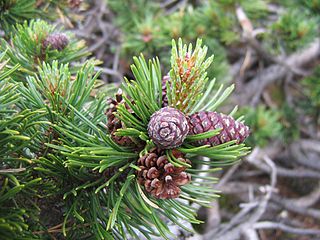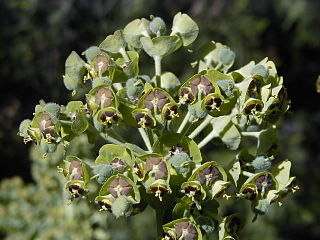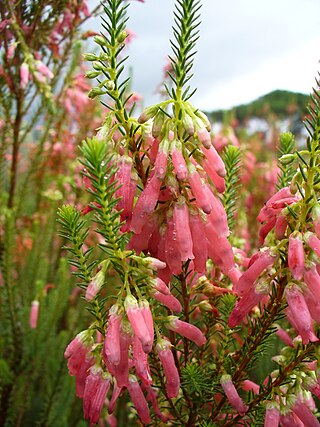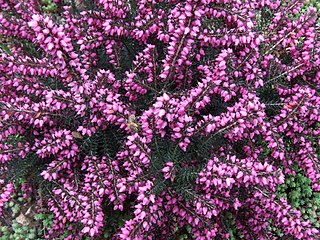
Erica arborea, the tree heath or tree heather, is a species of flowering plant (angiosperms) in the heather family Ericaceae, native to the Mediterranean Basin and Ethiopia, Kenya and Tanzania in East Africa. It is also cultivated as an ornamental.

Deutzia is a genus of about 60 species of flowering plants in the family Hydrangeaceae, native to eastern and central Asia, and Central America and also Europe. By far the highest species diversity is in China, where 50 species occur.

Erica is a genus of roughly 857 species of flowering plants in the family Ericaceae. The English common names heath and heather are shared by some closely related genera of similar appearance. The genus Calluna was formerly included in Erica – it differs in having even smaller scale-leaves, and the flower corolla consisting of separate petals. Erica is sometimes referred to as "winter heather" to distinguish it from Calluna "summer heather".

Pinus mugo, known as dwarf mountain pine, mountain pine, scrub mountain pine, Swiss mountain pine, bog pine, creeping pine, or mugo pine, is a species of conifer, native to high elevation habitats from southwestern to Central Europe and Southeast Europe.

Dicentra, known as bleeding-hearts, is a genus of eight species of herbaceous plants with oddly shaped flowers and finely divided leaves, native to eastern Asia and North America.

Calluna vulgaris, common heather, ling, or simply heather, is the sole species in the genus Calluna in the flowering plant family Ericaceae. It is a low-growing evergreen shrub growing to 20 to 50 centimetres tall, or rarely to 1 metre (40 in) and taller, and is found widely in Europe and Asia Minor on acidic soils in open sunny situations and in moderate shade.

Sempervivum is a genus of about 40 species of flowering plants in the family Crassulaceae, commonly known as houseleeks. Other common names include liveforever and hen and chicks, a name shared with plants of other genera as well. They are succulent perennials forming mats composed of tufted leaves in rosettes. In favourable conditions they spread rapidly via offsets, and several species are valued in cultivation as groundcover for dry, sunny locations.

Molinia caerulea, known by the common name purple moor-grass, is a species of grass that is native to Europe, west Asia, and north Africa. It grows in locations from the lowlands up to 2,300 m (7,546 ft) in the Alps. Like most grasses, it grows best in acid soils, ideally pH values of between 3.5 and 5, however, it can continue to live under more extreme conditions, sometimes to as low as 2. It is common on moist heathland, bogs and moorland throughout Britain and Ireland. Introduced populations exist in northeastern and northwestern North America.

Erica vagans, the Cornish heath or wandering heath, is a species of flowering plant in the family Ericaceae, native to Ireland, Cornwall, western France and Spain. It is a vigorous, spreading, evergreen heather reaching 75 cm (30 in) tall and wide, with pink flowers borne in racemes 14 cm (6 in) long in summer and autumn. The Latin specific epithet vagans literally means "wandering"; in this context it means "widely distributed".

Erica cinerea, the bell heather, is a species of flowering plant in the heath family Ericaceae, native to western and central Europe.

Erica carnea, the winter heath, winter-flowering heather, spring heath or alpine heath, is a species of flowering plant in the family Ericaceae, native to mountainous areas of central, eastern and southern Europe, where it grows in coniferous woodlands or stony slopes.

Armeria maritima, the thrift, sea thrift or sea pink, is a species of flowering plant in the family Plumbaginaceae. It is a compact evergreen perennial which grows in low clumps and sends up long stems that support globes of bright pink flowers. In some cases purple, white or red flowers also occur. It is a popular garden flower and has been distributed worldwide as a garden and cut flower. It does well in gardens designed as xeriscapes or rock gardens. The Latin specific epithet maritima means pertaining to the sea or coastal.

Prunus lusitanica, the Portuguese laurel cherry or Portugal laurel, is a species of flowering plant in the rose family Rosaceae, native to the Iberian Peninsula, Morocco, the Macaronesian archipelagos, and the French Basque Country.
Berberis × hortensis is an interspecific hybrid shrub. Its parents are Berberis oiwakensis and Berberis japonica. It was raised in gardens during the 20th century, and has become an important garden and landscape plant.

Euphorbia characias, the Mediterranean spurge or Albanian spurge, is a species of flowering plant in the family Euphorbiaceae typical of the Mediterranean vegetation. It is an upright, compact evergreen shrub growing to 1.2 m tall and wide.

Erica mammosa, the nine-pin heath, is a species of flowering plant in the family Ericaceae, that is naturally restricted to the southwestern corner of the Western Cape, South Africa.

Rhododendron argyrophyllum (银叶杜鹃) is a species of flowering plant in the heath family Ericaceae. It is native to forested slopes at 1,600–2,300 m (5,200–7,500 ft) in E and NW Guizhou, S and W Sichuan, and NE Yunnan in China.

Syringa pubescens is a species of flowering plant in the lilac genus of the family Oleaceae, native to Korea and China.

Erica australis, the Spanish heath or Spanish tree heath, is a European species of flowering plant in the family Ericaceae.

Erica × darleyensis, is a plant hybrid between the heathers E. carnea and E. erigena, probably of garden origin.




















